-

新人教版高中英语必修3Unit 5 The Value of Money- Discovering Useful Structure教学设计
Step 3 Meaning1. 过去将来时表示从过去某一时间来看将要发生的动作或存在的状态, 常用在宾语从句中。一般由“would/should +动词原形”构成。She hoped that they would meet again someday. 她希望将来有一天他们能再见面。2. was/were going to+动词原形: 表示过去将要发生或很有可能发生的动作, 常用于口语中, 表示预言、意图或者打算等。He was going to start work the following week. 他打算下星期开始工作。3. was/were about to do: 常用来表示即将发生的动作, “刚要/正要做……”。注意该结构不与任何时间状语连用。I felt that something terrible was about to happen. 我感到某种可怕的事情即将发生。4.was/were to do: 表示“曾计划做某事”, 如果表示“本来计划做某事, 动作没实现”, 则需用 “was/were to have done”。She said she was to have told me about the accident. 她说她本来想告诉我关于事故的事。5.Start, go, come, leave, see, meet等动词的过去进行时: 表示就过去某一时刻而言即将发生的动作。She was coming later. 她随后就来。I had just put on my overcoat and was leaving to visit a friend of mine. 我刚穿上外套要去看我的一个朋友。

新人教版高中英语必修3Unit 5 The Value of Money-Listening &Speaking&Talking教学设计
4. A:We’d like to have someone to say a word at the beginning to welcome the group.B:↙Who?A:We thought that you or Dr.Johnson might do it.B用降调说Who,其意思是问,对方想让谁在开场时致欢迎词。Step 6 Pronunciation---Practice1. Listen to the short conversation and mark the intonation with ↗, ↙ or ↙, ↗. Then discuss with a partner what they intend to convey by using different intonation.Owner: You know what ?↗ It’s a million-pound bank note↙.Waiter 1: Really ?↗(question)Waiter 2: Really !↙(unbelievable and surprised)Waiter 3: Really ?!↙↗(first question then surprised)2. Listen to the conversations. Underline the parts that are stressed and mark the intonation. Then talk about the implied meanings of the responses with different intonations. Listen again and repeat.1) Henry: It’s a nice suit.Owner: Oh, it’s perfect!↙(The intonation means it is very suitable for Henry.)2) Henry: Well, that’s very kind of you.Owner: Kind, sir ?↗(what you said is not right) No, it’s kind of you. You must come whenever you want and have whatever you like. Just having you sit here is a great honour !!↙(welcome you to come again)3)Henry:Well, to be honest, I have none. Oliver:(happily) What luck!(excited) Brother↗, what luck!↙(It means “Didn’t you hear it?”)Henry: Well, it may seem lucky to you but not to me!↗(angry) If this is your idea of some kind of joke, I don’t think it’s very funny. Now if you’ll excuse me, I ought to be on my way.↙(If so, I would leave.)Roderick: Please don’t go↙...(hope Henry can wait for a moment)Part B Viewing and Talking---Describe people’s changing attitudes in a film clipStep 1 Before-listening---Tell the filmYou are going to watch part of the film The Million Pound Bank Note. Look at these photos and guess what happens in the film.

新人教版高中英语必修3Unit 5 The Value of Money-Listening &Speaking教学设计
Step 4: Listen again and decide if the following statements are true (T) or false (F).1 It was the first time Chen Liyan's story was reported. T口 F口2 Chen found 10,000 yuan in a small plastic bag in Taiyuan railway station口 F口3 Wang Zheng apologized to Chen because he couldn't offer her more money. T口 F口4 Chen took out a large loan to cure her daughter, T口 F口5 Wang set up a fundraising website for Chen's daughter after Chen told him about her situation. T口 F口Step 5:After listening, discuss the questions.1 What kind of person do you think Chen Liyan is?Chen Liyan is generous and honest because she returned a large sum of money to the owner.2 Did Chen return the money because she didn't need it?No. She returned the money because it was the right thing to do. Evidence for this is that she refused to accept the reward money because she felt that it had not been earned. 3 Is it common for people to do what Chen did?It depends on the culture. In some countries it is quite common to return money that has been found. In other countries, people believe "Finders are keepers!" 4 How did Wang Zheng feel about the return of his money?He must have been very happy and relieved to have gotten his money back. We know this because he thanked Chen repeatedly and even offered her a reward.5 Why did Ma Dongbao tell Wang about Chen's family?He must have had great sympathy for Chen and her daughter and wanted to help them.'We know this because he arranged help for them. 6 How did the news reporter feel about Chen's actions?The news reporter felt that it showed that money wasn't the most important thing in life. We know this because the reporter told us that this is what Chen believes. and then said, “that's a great attitude to take."

新人教版高中英语必修3Unit 5 The value of money-Reading and Thinking教学设计二
? Could you offer me some kind of work here?? I don’t want your charity, I just want an honest job.? Careless: I landed in Britain by accident.Step 7:Consolidation.? Find Henry? Roderick and Oliver were I .making a bet when they saw Henry, a poor young man. ? Know Henry? About a month ago, Henry was sailing and later he found himself carried out to sea by a strong wind. Fortunately, he 2.was spotted by a ship. And it was the ship that brought him to 3.England? Offer money to Henry ? Oliver and Roderick gave Henry a letter and told him that there was money in it. They 4.persuaded him to accept it, and made him 5.promise that it wouldn't be opened until 2 o'clock.Step 8:Language pointsa large amount of: a large quantity of; a great deal ofe.g. They bought a large amount of furniture before they moved their new house.make a bet: make an arrangement to risk money, etc. on an event of which the result is doubtful.e.g. We made a bet on the result of the match.permit sb to do something: allow somebody to do somethinge.g. My mother doesn’t permit me to ride in the street after it rained.by accident: as a result of chancee.g. I only found it by accident.stare at: look at somebody or something with the eyes wide open in a fixed gaze( in astonishment, wonder, fear, etc)to be honest: to tell you the truth; to be franke.g. To be honest, I don’t think we have a chance of winning.Step7 Homework:What do you think will happen to Henry? Will the bank-note help him or get him into trouble?

新人教版高中英语必修3Unit 5 The Value of Money-Reading and Thinking教学设计一
Everybody wants to get wealth.In today’s material world,making money or becoming wealthy symbolizes a person’s success and capability. Many people just make every effort, pay any price to attain greater wealth. With money,they can buy nice, large apartments in nice neighborhood. With money they can own luxurious cars. Wealth seems to bring all happiness in life.But is wealth the only road to happiness? Not really. There are many things in the world, which are beyond the means of money, such as friendship, love, health and knowledge. People are so preoccupied with struggling for money that they have no time or would not take the time to form or maintain friendship. What happiness can they feel living as lonely miserable creatures without love or friends in the world even if they accumulate tremendous wealth?In my opinion, people can’t do anything without money, but money is not everything. What money will bring you depends on your personal belief and goal in life. If you are kind enough to help others, especially the poor, money is a good thing to you. With it, you can do much more for the benefit of people and your country, and it will add to your own happiness. If you want money just for your own needs, you’ll never be satisfied or happy. In a word,you should have money spent for more people. Only then can money be the source of your happiness.Step 8 Homework4 students in a group, one acts Roderick, one Oliver, one servant and the fourth one acts Henry Adams, then listen to the tape, pay more attention to the difference between American English and British English in pronunciation, stress, tone.

新人教版高中英语必修3Unit 5 The Value of Money-Reading for Writing教学设计二
2. 您能看到, 我头发太长了。You can see that my hair is much too long.3. 无论什么时候, 只要您想回来就回来。Please come back whenever you want.4. 您仅有很少的头发要理! You only have too little hair to cut !5. 为您服务是我的荣幸!It is my honour to serve you!Step 9 Writing(Henry is walking down the street when he sees a sign for a place that cuts hair. He decides to have it cut. )H=Henry B=BarberH: Good afternoon, I’d like to have my hair cut, if I may. (The barber looks at Henry’s hair and continues cutting another man’s hair. ) Er, I’d really like a haircut. As you can see it’s much too long. B: (in a rude manner) Yes, I can see that. Indeed, I can. H: Fine, well, I’ll have a seat then. (He sits in one of the barber’s chairs. The barber turns to look at Henry. )B: It’s quite expensive here, you know! Are you sure you can afford it?H: Yes. I think so. (After his hair is cut, the barber tells Henry how much he must pay. Henry shows the barber the bank note. )B: Why Mr. . . (looks shocked)H: Adams. Henry Adams. I’m sorry. I don’t have any change. B: Please don’t worry! (wearing a big smile) Nothing to worry about! Nothing at all! Please come back whenever you want, even if you only have too little hair to cut! It will be my honour to serve you!Step 10 Pair workExchange drafts with a partner. Use this checklist to help your partner revise his/her draft.1. Are all the elements of a play included and in good order ?2. Do the character use suitable language ?3. Are the stage directions clear and useful ?4. Is the plot clear and exciting enough ?

新人教版高中英语必修3Unit 5 the value of money-Reading For Writing教学设计一
【参考范文】Narrator:(Henry is smiling as he leaves the restaurant. As he is walking down the street, he sees a sign for a place that cuts hair. He decides to get it cut. )H=Henry;B=Barber;R=rude manH:Good afternoon, I'd like to get a cut, if I may. (The barber looks at Henry's hair and continues cutting another man's hair. )Er, I'd really like a haircut. As you can see it's much too long. B:(in a rude manner) Yes, I can see that. Indeed, I can. H:Fine, well I'll have a seat then. (He sits in one of the barber's chairs. The barber turns to look at Henry. )B:It's quite expensive here, you know!Are you sure you can afford it?H:Yes. I think so. (In comes the rude man. )R:Hey you there. I need a haircut quickly. Can you do me straightaway?B:All right, then, get in the chair and I'll see what I can do. R:Thank you. (sits down in one of the barber's chairs)H:Excuse me, but I was here first. Aren't you going to do my hair first?B:This man's in a hurry. H:Well so am I!I insist that you cut my hair first. B:OK, but I'll have to be quick. This gentleman is waiting. H:Thank you. (They both become quiet. After his hair is cut, the barber tells Henry how much he must pay. Henry shows the barber the bank note. )B:Why, Mr . . . (looks shocked)H:Adams. Henry Adams. I'm sorry, I don't have any change. R:You're that Mr Adams! Well,I'm glad I waited or I might never have known it was you. B:Why, Mr Adams, please don't worry!(wearing a big smile) Nothing to worry about!Nothing at all!Please come back any time, even if you only need too little hairs cut!It will be my honour to serve you!

新人教版高中英语选修2Unit 5 First Aid-Discovering useful structures教学设计
You have no excuse for not going.你没有理由不去。He was punished for not having finished his homework.他因未完成作业而受到惩罚。2.动词ing形式复合结构由物主代词或人称代词宾格、名词所有格或普通格加动词ing,即“sb./sb.'s+doing”构成。动词ing形式的复合结构实际上是给动词ing形式加了一个逻辑主语。动词ing形式的复合结构有四种形式:①形容词性物主代词+动词ing②名词所有格+动词ing③代词宾格+动词ing④名词+动词ingHer coming to help encouraged all of us.她来帮忙鼓舞了我们所有人。The baby was made awake by the door suddenly shutting.这个婴儿被突然的关门声吵醒了。Can you imagine him/Jack cooking at home?你能想象他/杰克在家做饭的样子吗?无生命名词无论是作主语还是作宾语都不能用第②种形式。Tom's winning first prize last year impressed me a lot.汤姆去年得了一等奖使我印象深刻。Do you mind my/me/Jack's/Jack leaving now?你介意我/杰克现在离开吗?Excuse me for my not coming on time.很抱歉我没能按时来。His father's being ill made him worried.他父亲病了,他很担心。We are looking forward to the singer's/the singer to give us a concert.我们盼望着这位歌手来给我们举办一场演唱会。
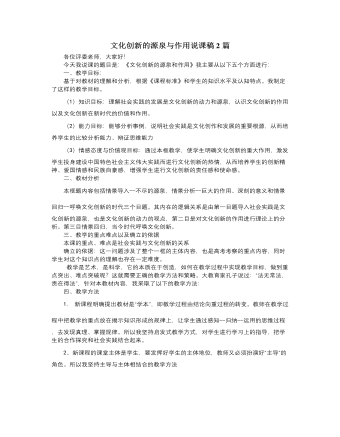
人教版高中政治必修3文化创新的源泉与作用说课稿2篇
一、教学目标:基于对教材的理解和分析,根据《课程标准》和学生的知识水平及认知特点。我制定了这样的教学目标。(1)知识目标:理解社会实践的发展是文化创新的动力和源泉,认识文化创新的作用以及文化创新在新时代的价值和作用。(2)能力目标:能够分析事例,说明社会实践是文化创作和发展的重要根源,从而培养学生的比较分析能力、辩证思维能力(3)情感态度与价值观目标:通过本框教学,使学生明确文化创新的重大作用,激发学生投身建设中国特色社会主义伟大实践而进行文化创新的热情,从而培养学生的创新精神、爱国情感和民族自豪感,增强学生进行文化创新的责任感和使命感。二、教材分析本框题内容包括情景导入--不尽的源泉,情景分析--巨大的作用、深刻的意义和情景回归--呼唤文化创新的时代三个目题。其内在的逻辑关系是由第一目题导入社会实践是文化创新的源泉,也是文化创新的动力的观点,第二目是对文化创新的作用进行理论上的分析。第三目情景回归,当今时代呼唤文化创新。
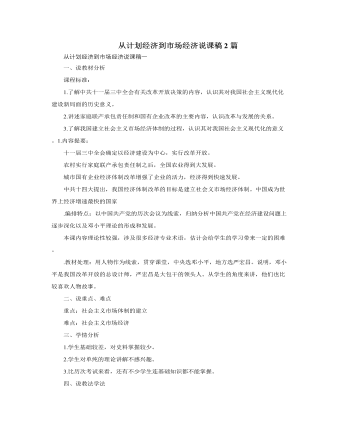
人教版高中历史必修2从计划经济到市场经济说课稿2篇
第一阶段政策性调整阶段管理体制高度集中管理体制政企分开,简政放权,扩大企业自主权所有制单一的公有制经济发展以公有制为主体的多种所有制经济分配制度平均主义以按劳分配为主的多种分配方式第二阶段制度创新阶段产权制度国有制实行以股份制为主要形式的现代企业制度问:无论是农村经济体制改革还是城市经济体制改革都取得了可喜的成就,具有深远的意义。那整个经济体制改革又有什么样的意义呢?学生回答:调动了------解放了------推动了------。总结:经济改革-------促进------社会发展 一个问题-------经济体制改革 两个方面-------农村、城市 三个意义-------农村、城市、经济老师讲授:改革不是一帆风顺的,它面临着复杂的国内外形势。但是,邓小平不愧是中国改革开放的总设计师,中国社会主义现代化建设的领路人。他冲破重重阻碍,南下上海、深圳等地视察,发表著名的“南方谈话”,建立起社会主义的市场经济体制,实现了经济体制改革的目标。投影显示:邓南下图片。“十四大”会场。社会主义市场经济体制建立的过程。
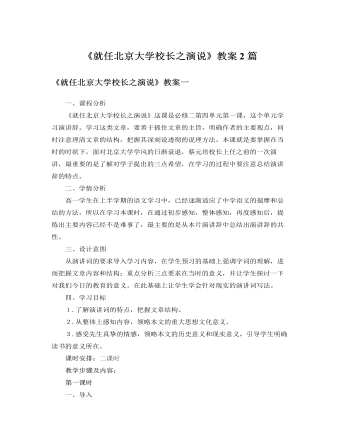
人教版高中语文必修2《就任北京大学校长之演说》教案2篇
(现状:①对于教员,不能以诚相待,礼敬有加,只是利用耳。2段:因做官心切,对于教员,则不问其学问浅深,唯问其官阶之大小。官阶大者,特别欢迎,盖唯将来毕业有人提携。②对于同学校友,不能开诚布公,道义相勖。)他的第三点要求是,要求青年学子。这是从个人涵养方面来说的。尊敬师长,团结友爱,互相勉励,共同提高,是建设良好校风必须具备的条件。端正学风,改善校风,就是为培养学术研究新风气创造条件。全校上下树立了新风尚,学校的学术气也就会很快浓起来。这也是贯彻“思想自由”的办学方针,不可或缺的措施。蔡元培先生在他这次演讲中,始终是围绕着他的办学方针来阐述的。(四)蔡先生提出两点计划,目的为何?思考、讨论、明确:一曰改良讲义,以期学有所得,能裨实用。
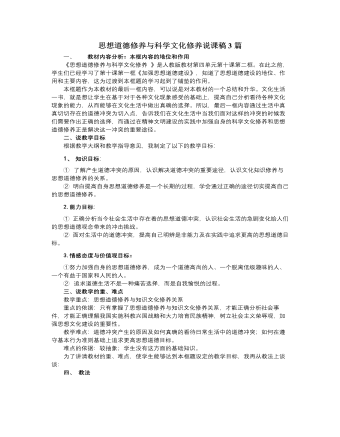
人教版高中政治必修3思想道德修养与科学文化修养说课稿3篇
(3)改造主观世界同改造客观世界的关系。改造客观世界同改造主观世界,是相互联系、相互作用的。改造主观世界是为了更好地改造客观世界,人们在改造客观世界的同时也改造着自己的主观世界。通过自觉改造主观世界,又能提高改造客观世界的能力。师:人们对自己的思想道德境界的追求,是永远止境的。让我们共同努力,在践行社会主义思想道德的过程中,不断追求更高的目标,像无数先辈那样,加入到为共产主义远大理想而奋斗的行列中吧!课堂小结通过本节课学习使我们认识到面对现实生活中的思想道德冲突,加强知识文化修养和思想道德修养,不断追求更高的思想道德目标的必要性;把握了知识文化修养与思想道德修养的含义及其相互关系;明确了我们应该和怎样追求更高的思想道德目标;认识到这是一个永无止境的过程。我们要脚踏实地,从现在做起、从点滴小事做起,不断提高知识文化修养和思想道德修养,追求更高的思想道德目标。
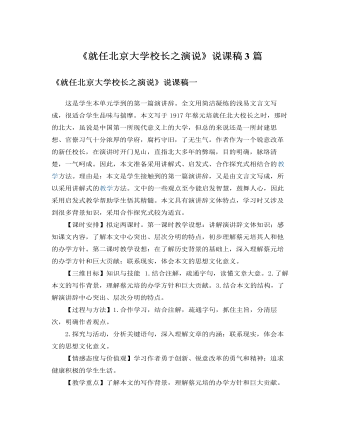
人教版高中语文必修2《就任北京大学校长之演说》说课稿3篇
(三)教学重、难点1、教学重点:结合课文,了解演讲辞针对性强、条理清楚、通俗易懂、适当的感情色彩等特点。2、教学难点:深入理解文章内涵,联系现实,体会本文的现实意义二、说学情高中学生在初中阶段已经接触过演讲辞了,对演讲词的特点已经有了一些基本的知识,因此本轮的教学应该让他们在此基础上有所提高。本文是学生在高中阶段第一次接触演讲辞,有必要让他们了解演讲辞的特点及课文如何体现这些特点的。随着年龄的增长,生活阅历的增加,高中学生正逐渐形成自己对世界、对人生的看法,蔡元培先生的这篇文章能很好地激发他们对当前的高中学习和未来的大学生活进行思考。此外,学生对北大的历史及蔡元培先生作这番演讲的时代背景了解不深,应作出补充说明。
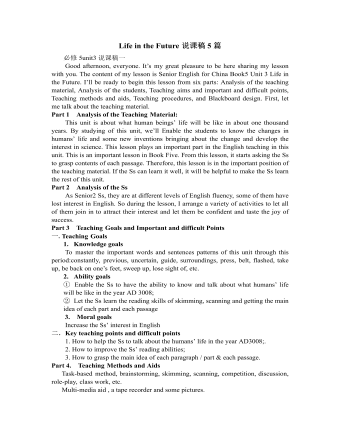
人教版高中英语必修5Life in the Future说课稿5篇
Good afternoon, everyone. It’s my great pleasure to be here sharing my lesson with you. The content of my lesson is Senior English for China Book5 Unit 3 Life in the Future. I’ll be ready to begin this lesson from six parts: Analysis of the teaching material, Analysis of the students, Teaching aims and important and difficult points, Teaching methods and aids, Teaching procedures, and Blackboard design. First, let me talk about the teaching material.Part 1 Analysis of the Teaching Material:This unit is about what human beings’ life will be like in about one thousand years. By studying of this unit, we’ll Enable the students to know the changes in humans’ life and some new inventions bringing about the change and develop the interest in science. This lesson plays an important part in the English teaching in this unit. This is an important lesson in Book Five. From this lesson, it starts asking the Ss to grasp contents of each passage. Therefore, this lesson is in the important position of the teaching material. If the Ss can learn it well, it will be helpful to make the Ss learn the rest of this unit.Part 2 Analysis of the SsAs Senior2 Ss, they are at different levels of English fluency, some of them have lost interest in English. So during the lesson, I arrange a variety of activities to let all of them join in to attract their interest and let them be confident and taste the joy of success.
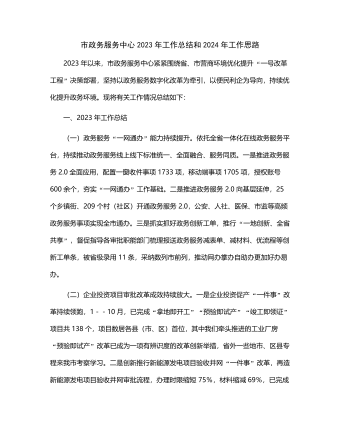
市政务服务中心2023年工作总结和2024年工作思路
(二)坚持数字赋能,推动政务服务好办易办。一是持续推进政务服务“一网通办”。以提升高质量“一网通办”率为抓手,聚焦政务创新工单采纳,指导督促相关部门加强对涉企高频事项表单、材料、流程等办理要素的研究和梳理,压实事项部门主体责任,督促部门做好向上对接,提高工单采纳率。二是持续抓好超期受理、办理件治理工作。督促重点部门落实专人盯紧审批办件系统,按期受理办理,抓好超期件整改。三是加大政务服务网办、掌办、自助办推广力度。持续推进政务大厅智慧化建设,完善24小时全天候政务自助服务,优化“瓯e办”便民服务自助终端布点,强化政务服务网办、掌办、自助办工作导引和帮办助办,推动政务服务网办掌办自助办更加好办易办。(三)突出便民利企,推动政务服务体系建设。深化市乡村三级便民服务体系建设,持续优化“15分钟政务服务圈”,推动政务服务更便捷。
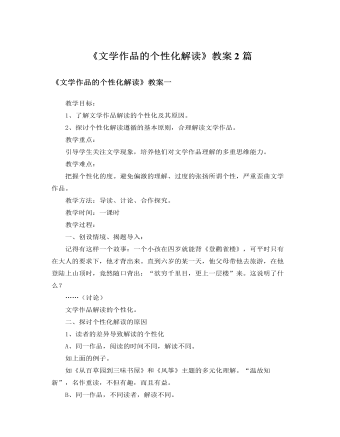
人教版高中语文必修3《文学作品的个性化解读》教案2篇
教学目标:1、了解文学作品解读的个性化及其原因。2、探讨个性化解读遵循的基本原则,合理解读文学作品。教学重点:引导学生关注文学现象,培养他们对文学作品理解的多重思维能力。教学难点:把握个性化的度。避免偏激的理解、过度的张扬所谓个性,严重歪曲文学作品。教学方法:导读、计论、合作探究。教学时间:一课时教学过程:一、创设情境、揭题导入:记得有这样一个故事:一个小孩在四岁就能背《登鹳雀楼》,可平时只有在大人的要求下,他才背出来。直到六岁的某一天,他父母带他去旅游,在他登陆上山顶时,竟然随口背出:“欲穷千里目,更上一层楼”来。这说明了什么?……(讨论)文学作品解读的个性化。二、探讨个性化解读的原因1、读者的差异导致解读的个性化A、同一作品,阅读的时间不同,解读不同。如上面的例子。如《从百草园到三味书屋》和《风筝》主题的多元化理解。“温故知新”,名作重读,不但有趣,而且有益。B、同一作品,不同读者,解读不同。
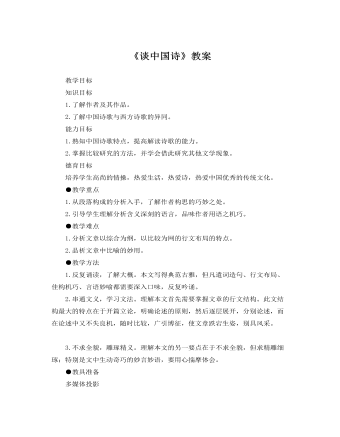
人教版高中语文必修5《谈中国诗》教案
教师提示:1.这句话的本体不是一般意义上的“中国诗”,即不是指中国诗歌中的某一类作品或某位诗人的作品,而是指中国诗的发展特点。早熟,是指“纯粹的抒情诗的精髓和峰极,在中国诗里出现得异常之早”;早衰,是指“中国诗一蹴而至崇高的境界,以后就缺乏变化,而且逐渐腐化”(腐化,是对诗的思想内容和艺术价值而言的)。这句话,借助比喻和比喻中的对比(“早熟”与“早衰”),从诗歌发展的角度,简要地说明了中国诗的艺术特征和由此产生的负面影响。2.这句话有两层意思:一是借梵文的《百喻经》阐释中国的艺术和思想体构上的缺欠,旨在批评;二是点明造成这种缺欠的根本原因。“一个印度愚人要住三层楼而不许匠人造底下两层”这样的建筑物就是“飘飘凌云的空中楼阁”,作者以此作喻,批评中国的艺术和思想体构缺乏严密的逻辑性,往往脱离客观实际,没有坚实的基础,其结果必定影响艺术的健康、稳定地发展。
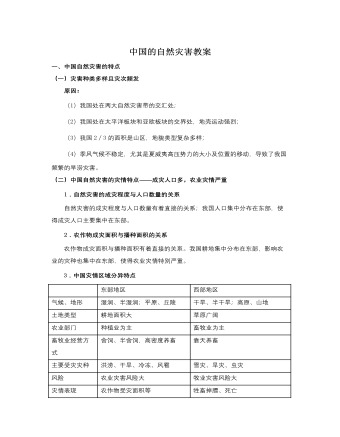
人教版高中地理选修5中国的自然灾害教案
(3)2004年6月末至7月初,广东省出现罕见的大面积持续高温炎热天气,全省有45个县(市)的最高气温破历史同期记录。造成此次异常天气的主要原因是()A.副热带高压和热带气旋外围下沉气流共同影响B.大量使用汽车和制冷设备C.绿色植物呼吸作用释放CO:D.全球温室效应长期作用【解析】(1)根据“源于西太平洋洋面的台风”判断该台风属于北半球的气旋型的天气系统,当台风中心位于南海时,广东沿海地区正好位于该气旋的北部,故吹东北风。(2)夏秋季节的台风主要影响我国的南部、东部沿海地区,广东沿海正好位于该地区,受到的影响较大;广东沿海是我国经济非常发达的地区,富含有N、P、K等营养元素的工厂生产、农业生产、生活废水的排放导致海水中的藻类物质大量繁殖,水中的溶解氧减少,鱼类因窒息而死亡的现象在该地区时常发生。(3)从题干中提供的信息分析可知,6月末至7月初为北半球的夏季,因是短期的高温,与正常年份相比出现异常天气是因副热带高压和热带气旋外围下沉气流共同影响。

教师在XX中学暑期师德师风专项巡查和整治工作总结
学校还设立举报箱公布举报热线暑期安排值班人员及时收集有关教师师德师风情况的反馈息。从多角度、多渠道强化师德师风建设每位教师都受社会和人民的监督。五、严格查处有偿家教根据教育局规定严禁教师从事有偿家教。除了会议上多次强调以外我校教师还签订“关于拒有偿家教”的承诺书。同时师德师风专项巡查和整治领导小组利用暑假期间不定期深入群众中去通过走访调查、实地考察等途径实时掌握我校教师是否存在“有偿家教”的问题一经发现及时制止并汇报教育局。至今止我校并未发现有师从事有偿补课的现象。总之通过狠抓师德师风建设工作使学校教师深深体会到只有制度完善、强过程管理发现问题及时处理才能证师德建设有成效。这次暑期师德师风专项巡查和整治以法制学习教育和组织教师进行自查依托以“以法治校”的制度管理、科学评估、重在激励手段形成良好的教师队伍树立教师的职业道德形象。
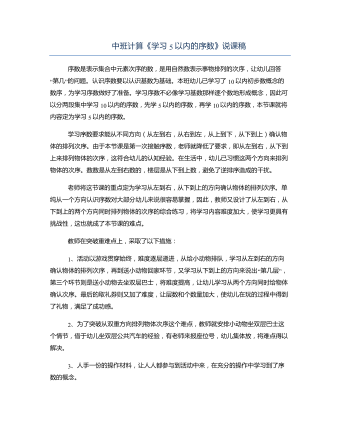
中班计算《学习5以内的序数》说课稿
序数是表示集合中元素次序的数,是用自然数表示事物排列的次序,让幼儿回答“第几”的问题。认识序数要以认识基数为基础。本班幼儿已学习了10以内初步数概念的数序,为学习序数做好了准备。学习序数不必像学习基数那样逐个数地形成概念,因此可以分两段集中学习10以内的序数,先学5以内的序数,再学10以内的序数,本节课就将内容定为学习5以内的序数。学习序数要求能从不同方向(从左到右,从右到左,从上到下,从下到上)确认物体的排列次序。由于本节课是第一次接触序数,老师就降低了要求,即从左到右,从下到上来排列物体的次序,这符合幼儿的认知经验。在生活中,幼儿已习惯这两个方向来排列物体的次序。数数是从左到右数的,楼层是从下到上数,避免了逆排序造成的干扰。

